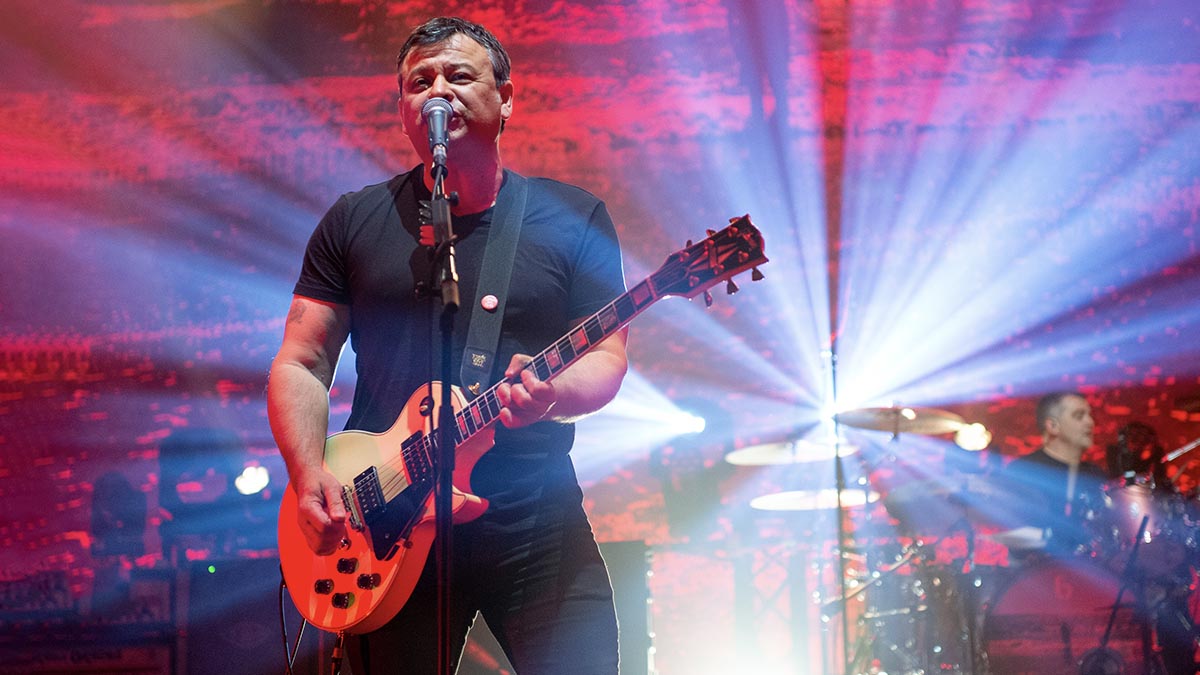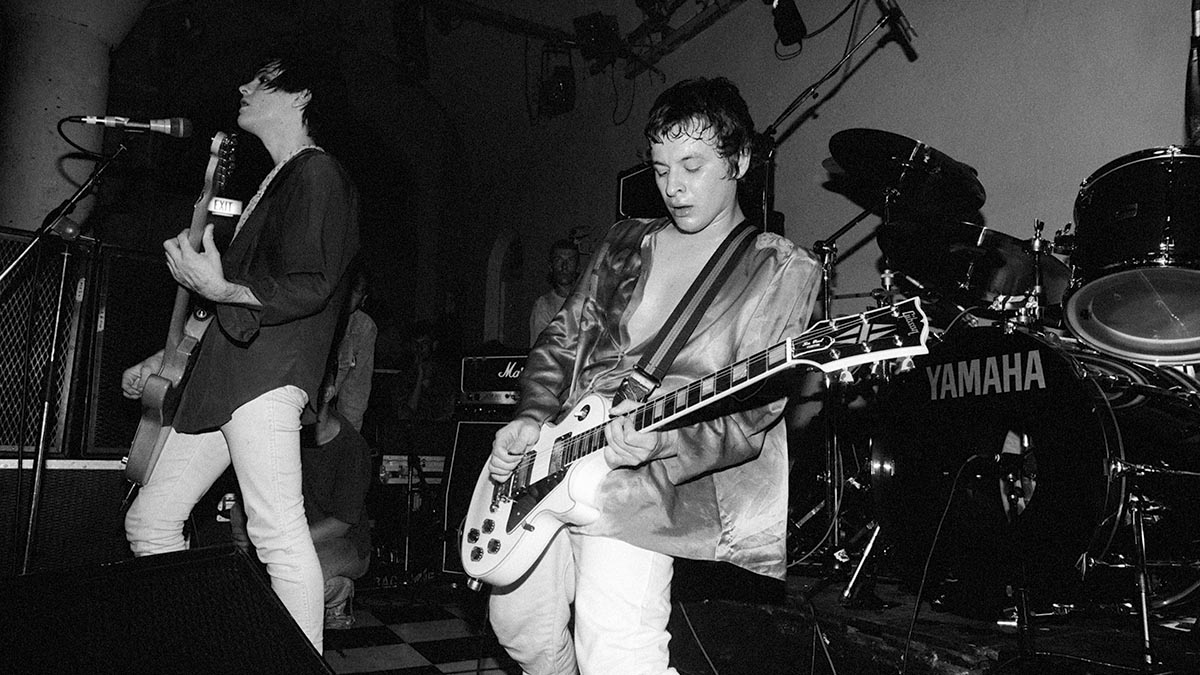James Dean Bradfield shares the secrets behind his songwriting and guitar craft
He started out playing a Les Paul to sound like the Sex Pistols’ Steve Jones. Now, he’s channeling Abba and declaring “I love my Strat!” The Manic Street Preachers frontman offers a few lessons he’s learned along the way

For the past few Manic Street Preachers albums James Dean Bradfield has kept a ‘guitar diary’, detailing the instruments he’s used on every track.
The entries for the Manics’ 14th record, The Ultra Vivid Lament, mention his trusty white Les Paul Custom (signed by his Sex Pistols hero Steve Jones), a Troublemaker Tele from Fender’s ‘Parallel Universe’ collection, a cool-if-clunky vintage Roland GR-500 synth guitar, a Burns baritone guitar, and Bradfield’s one bespoke acoustic, made by Welsh luthier Richard Meyrick.
Also on the list is a ’62 Strat, an oddity for this noted Gibson player. “What is it about getting older?” the 52 year-old wonders aloud. “You start thinking, ‘I think I’ll try some gin! I might go on a cruise! I really like playing Strats!’ I was always religiously against them when I was young. In my head, Strats were more for serious, nuanced players, whereas Gibsons just had that strident, classic rock edge. Now though, I love my Strat.”
Written mainly on piano, The Ultra Vivid Lament sees Bradfield, bassist Nicky Wire and drummer Sean Moore in melodic and relatively non-confrontational mode. “I didn’t want to listen to something that was going to bludgeon me after what’s gone on in the last few years,” he says.
“I wanted something with a lot more light and shade. I was finding comfort in music, rather than just music telling me an undeniable truth. We decided that if we didn’t want that from music during lockdown, during COVID, what gives us the right to foist that upon somebody?”
With this in mind, this iconic guitarist sat down with Total Guitar to offer us his unique perspective on the craft...
There’s more to getting the sound than just getting the guitar
“I wanted a white Les Paul Custom really early on, because of Steve Jones and Lindsey Buckingham, who I thought looked amazingly cool. The band bought mine for me when we first went up to London [in 1990], which was so generous, an amazing moment.
Get The Pick Newsletter
All the latest guitar news, interviews, lessons, reviews, deals and more, direct to your inbox!
“I wanted Steve Jones’ sound, and I thought it was in that guitar, but I quickly found out it’s about more than just the guitar. I used to think this ‘it’s all in the fingers’ stuff was bullshit, but there is something there. I’ve seen Steve Jones use just Marshall stacks and ‘bog- standard’ Gibsons, and it still kind of sounds like him. It really freaks me out – I don’t know how he does it.”
Learn by copying the music you love
“The first thing I ever learned was the start to Queen’s Crazy Little Thing Called Love. Nicky taught me my first D chord in art class, and I remember thinking it was easy, but then found it got much harder than that. I bought my first guitar, a black Kay Les Paul copy, for 20 quid, then just started – I just learned and learned and learned and had a great time.
“The biggest way for me to learn anything is just by copying, then you find you can understand it. That’s how I break stuff down. The first thing I wanted to learn properly was Complete Control by The Clash. I listened, it was in E, so I played around [on the fretboard] – ‘So it’s that, then that and, yes – I’ve got it!’
“Then after a few months I tried something really hard, This Charming Man by The Smiths. Eventually, I got it and it all made sense. I learned by not caring about seeing anybody or doing anything else and just being consumed by playing the guitar for two years, and really enjoying it. It’s really cool, man.”

You don’t need to know scales
“I’m not remotely intellectual but I’ve got good instincts about stuff , I’m good at understanding things on my terms. On [the Manics’ classic 1992 single] Motorcycle Emptiness I knew what the chords were doing [E, B/D#, C#m, Aadd9]. It starts off with hope [he plays the E], but there’s doubt somewhere [plays the C#m] then there’s resignation [plays the Aadd9].
“That’s how I’m hearing it. And I guarantee you – anybody who knows how to play guitar will come up with some kind of riff to go over the top of it without knowing theory. Only certain things will go with those chords. It’s like if you’ve been given three colours. What are you going to paint? It’s just really that simple.
“For the song Everything Must Go, I heard [The Ronettes’] Be My Baby, and thought what if I could do something like that but have it much unhappier? So I worked on it until, ‘Yeah, that’s it!’ It’s not magic, there’s no theory. It’s just fucking around. I might as well be scratching my feet but instead I’m scratching the guitar.”
Writing on piano can change your approach to your guitar parts
“I wrote all the music for the new album on the piano, so when I came to the guitar, I wasn’t quite sure what to play. There’s not many big powerchords on here. On Blank Diary Entry I was punching in between the gaps between mine and [guest artist] Mark Lanegan’s vocals.
“There’s barely any electric on Into The Waves Of Love – I wanted to find the kind of thing Peter Buck might play on an early R.E.M. record, or an early-period Talking Heads idea. There’s a definite ABBA influence to Don’t Let The Night Divide Us, and ABBA were big on just doing one single line on a fuzz guitar then putting a good long spring echo on it, so that’s what I played in there.
“On Orwellian, Phil Manzanera became the big influence – the way he just plays when he needs to on Roxy Music’s early 80s stuff . He does a lovely little lick here and there, and it matters somehow.
“Nick said to me 10 years ago, ‘When you put a guitar track down you don’t have to just keep playing’, which I’d been really guilty of because in my head we were powered by punk or post-punk, so I was always filling the space. Now I can just lay back and not play all the time. So when I actually do play a part it might have more impact.”
Listen to your bandmates – and try to keep up with them
“On [1994 album] The Holy Bible, Sean was playing such amazing rhythms. On If White America Told The Truth One Day Its World Would Fall Apart, he’s playing something like out of a fight scene from West Side Story, a Leonard Bernstein vibe.
“I knew I had to engage with that. I’d written a little riff I thought I’d let go of it in the rehearsal room, but Sean had built the drums around it so much that once I took that guitar away none of it worked, so we just kept it.
“There’s a lot of riffs on The Holy Bible and Sean kept plugging into them with really dense, detailed drumming. I loved playing guitar on that record. It became really intense with me and Sean linking together.”
It’s a good sign when you can sing the guitar solo
“I do like a good, graceful guitar solo. There are a few, like the one at the end of [The Holy Bible’s] Archives Of Pain, which are quite indulgent, but I think some of my best solos are stuff like La Tristesse Durera [from Gold Against The Soul], which is like a little musical section in itself.
“I like it when you can sing the solo. Much to Slash’s credit, I think he brought that back to a certain degree. In the early days of Guns N’ Roses, you could sing a lot of his guitar parts.”
The better you know your parts, the better you’ll sound in the studio
“The first guitarist that got me turned on to how you can play guitar in the studio and orchestrate it was Johnny Marr. ‘How does he get that sound? It’s amazing!’ Then you listen closer you realise he was tracking the guitars three, four times sometimes, but so precisely.
“That tells you he knew his part – he wasn’t just jamming, the part was organised in his head, otherwise he couldn’t track it so brilliantly. He was the first guitarist who made me think, ‘Right, he’s using that amp, a little bit of delay on something like What Difference Does It Make, then he was tracking it’.
“He was the first person to make me realise that not everything was as it appeared on stage. Once you go behind the curtain of the studio, you can make it sound so much better.”
Cultivate a good relationship with your producer
“For Motorcycle Emptiness, our producer Steve Brown locked me in the studio with the song’s intro on repeat. He said, ‘If you want to be Slash, you have to have a riff people will know you for. Until I hear it, you’re not leaving!’
“I was thrashing away, then eventually I flicked to the neck pickup for that creamier tone, and was sort of thinking, ‘What would Slash do? Okay, I’ve gotta start with a bend.’ Then for [the riff ’s ascending line] I wanted it like when an orchestra chases the note.
“Eventually Steve walked in and said, ‘There you go – you got it!’ That wouldn’t have happened if he hadn’t locked me in the room. These days, the producer has an incredible amount of power and influence.
“Bands will do multiple takes, walk out of the room, and let the producer and engineer comp everything to a very rigid grid. I just wouldn’t let people do that. You’ve got to be engaged with everything, and interested in what the producer is doing for you. Be there; be present.”
- Ultra Vivid Lament is out now via Columbia.
Grant Moon is the News Editor for Prog magazine and has been a contributor to the magazine since its launch in 2009. A music journalist for over 20 years, Grant writes regularly for titles including Classic Rock and Total Guitar, and his CV also includes stints as a radio producer/presenter and podcast host. His first book, Big Big Train - Between The Lines, is out now through Kingmaker Publishing.
“I just learned them from the records. I don’t read tabs or anything, I don’t read music – I learned by ear”: How a teenage Muireann Bradley put a cover of Blind Blake’s Police Dog Blues on YouTube and became a standard bearer for country blues
“The Strat was about as ‘out’ as you could get. If you didn’t have a Floyd Rose, it was like, ‘what are you doing?’”: In the eye of the Superstrat hurricane, Yngwie Malmsteen stayed true to the original











